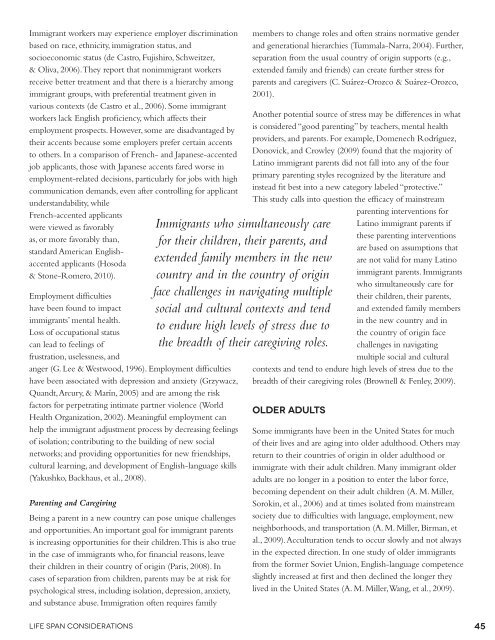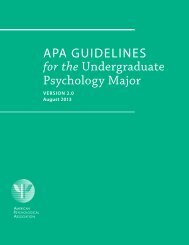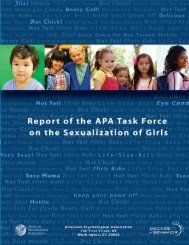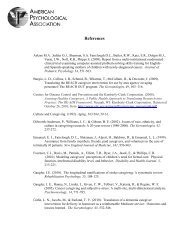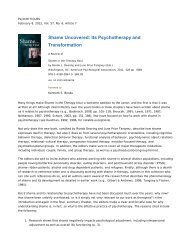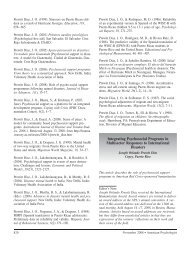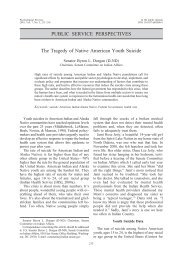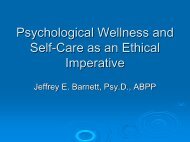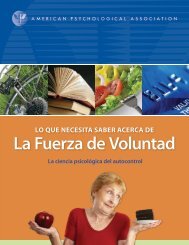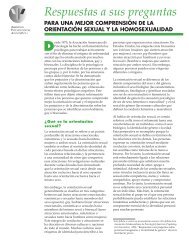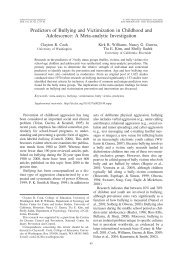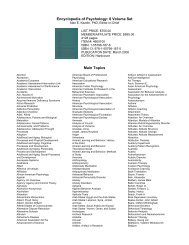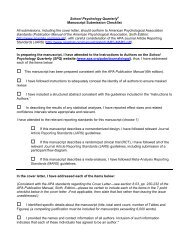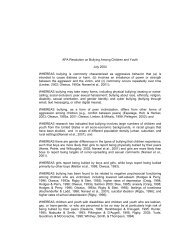Crossroads: The Psychology of Immigration in the New Century
Crossroads: The Psychology of Immigration in the New Century
Crossroads: The Psychology of Immigration in the New Century
Create successful ePaper yourself
Turn your PDF publications into a flip-book with our unique Google optimized e-Paper software.
Immigrant workers may experience employer discrim<strong>in</strong>ation<br />
based on race, ethnicity, immigration status, and<br />
socioeconomic status (de Castro, Fujishiro, Schweitzer,<br />
& Oliva, 2006). <strong>The</strong>y report that nonimmigrant workers<br />
receive better treatment and that <strong>the</strong>re is a hierarchy among<br />
immigrant groups, with preferential treatment given <strong>in</strong><br />
various contexts (de Castro et al., 2006). Some immigrant<br />
workers lack English pr<strong>of</strong>iciency, which affects <strong>the</strong>ir<br />
employment prospects. However, some are disadvantaged by<br />
<strong>the</strong>ir accents because some employers prefer certa<strong>in</strong> accents<br />
to o<strong>the</strong>rs. In a comparison <strong>of</strong> French- and Japanese-accented<br />
job applicants, those with Japanese accents fared worse <strong>in</strong><br />
employment-related decisions, particularly for jobs with high<br />
communication demands, even after controll<strong>in</strong>g for applicant<br />
understandability, while<br />
French-accented applicants<br />
were viewed as favorably<br />
as, or more favorably than,<br />
standard American Englishaccented<br />
applicants (Hosoda<br />
& Stone-Romero, 2010).<br />
Employment difficulties<br />
have been found to impact<br />
immigrants’ mental health.<br />
Loss <strong>of</strong> occupational status<br />
can lead to feel<strong>in</strong>gs <strong>of</strong><br />
frustration, uselessness, and<br />
anger (G. Lee & Westwood, 1996). Employment difficulties<br />
have been associated with depression and anxiety (Grzywacz,<br />
Quandt, Arcury, & Marín, 2005) and are among <strong>the</strong> risk<br />
factors for perpetrat<strong>in</strong>g <strong>in</strong>timate partner violence (World<br />
Health Organization, 2002). Mean<strong>in</strong>gful employment can<br />
help <strong>the</strong> immigrant adjustment process by decreas<strong>in</strong>g feel<strong>in</strong>gs<br />
<strong>of</strong> isolation; contribut<strong>in</strong>g to <strong>the</strong> build<strong>in</strong>g <strong>of</strong> new social<br />
networks; and provid<strong>in</strong>g opportunities for new friendships,<br />
cultural learn<strong>in</strong>g, and development <strong>of</strong> English-language skills<br />
(Yakushko, Backhaus, et al., 2008).<br />
Parent<strong>in</strong>g and Caregiv<strong>in</strong>g<br />
Be<strong>in</strong>g a parent <strong>in</strong> a new country can pose unique challenges<br />
and opportunities. An important goal for immigrant parents<br />
is <strong>in</strong>creas<strong>in</strong>g opportunities for <strong>the</strong>ir children. This is also true<br />
<strong>in</strong> <strong>the</strong> case <strong>of</strong> immigrants who, for f<strong>in</strong>ancial reasons, leave<br />
<strong>the</strong>ir children <strong>in</strong> <strong>the</strong>ir country <strong>of</strong> orig<strong>in</strong> (Paris, 2008). In<br />
cases <strong>of</strong> separation from children, parents may be at risk for<br />
psychological stress, <strong>in</strong>clud<strong>in</strong>g isolation, depression, anxiety,<br />
and substance abuse. <strong>Immigration</strong> <strong>of</strong>ten requires family<br />
Life Span Considerations<br />
Immigrants who simultaneously care<br />
for <strong>the</strong>ir children, <strong>the</strong>ir parents, and<br />
extended family members <strong>in</strong> <strong>the</strong> new<br />
country and <strong>in</strong> <strong>the</strong> country <strong>of</strong> orig<strong>in</strong><br />
face challenges <strong>in</strong> navigat<strong>in</strong>g multiple<br />
social and cultural contexts and tend<br />
to endure high levels <strong>of</strong> stress due to<br />
<strong>the</strong> breadth <strong>of</strong> <strong>the</strong>ir caregiv<strong>in</strong>g roles.<br />
members to change roles and <strong>of</strong>ten stra<strong>in</strong>s normative gender<br />
and generational hierarchies (Tummala-Narra, 2004). Fur<strong>the</strong>r,<br />
separation from <strong>the</strong> usual country <strong>of</strong> orig<strong>in</strong> supports (e.g.,<br />
extended family and friends) can create fur<strong>the</strong>r stress for<br />
parents and caregivers (C. Suárez-Orozco & Suárez-Orozco,<br />
2001).<br />
Ano<strong>the</strong>r potential source <strong>of</strong> stress may be differences <strong>in</strong> what<br />
is considered “good parent<strong>in</strong>g” by teachers, mental health<br />
providers, and parents. For example, Domenech Rodríguez,<br />
Donovick, and Crowley (2009) found that <strong>the</strong> majority <strong>of</strong><br />
Lat<strong>in</strong>o immigrant parents did not fall <strong>in</strong>to any <strong>of</strong> <strong>the</strong> four<br />
primary parent<strong>in</strong>g styles recognized by <strong>the</strong> literature and<br />
<strong>in</strong>stead fit best <strong>in</strong>to a new category labeled “protective.”<br />
This study calls <strong>in</strong>to question <strong>the</strong> efficacy <strong>of</strong> ma<strong>in</strong>stream<br />
parent<strong>in</strong>g <strong>in</strong>terventions for<br />
Lat<strong>in</strong>o immigrant parents if<br />
<strong>the</strong>se parent<strong>in</strong>g <strong>in</strong>terventions<br />
are based on assumptions that<br />
are not valid for many Lat<strong>in</strong>o<br />
immigrant parents. Immigrants<br />
who simultaneously care for<br />
<strong>the</strong>ir children, <strong>the</strong>ir parents,<br />
and extended family members<br />
<strong>in</strong> <strong>the</strong> new country and <strong>in</strong><br />
<strong>the</strong> country <strong>of</strong> orig<strong>in</strong> face<br />
challenges <strong>in</strong> navigat<strong>in</strong>g<br />
multiple social and cultural<br />
contexts and tend to endure high levels <strong>of</strong> stress due to <strong>the</strong><br />
breadth <strong>of</strong> <strong>the</strong>ir caregiv<strong>in</strong>g roles (Brownell & Fenley, 2009).<br />
older adults<br />
Some immigrants have been <strong>in</strong> <strong>the</strong> United States for much<br />
<strong>of</strong> <strong>the</strong>ir lives and are ag<strong>in</strong>g <strong>in</strong>to older adulthood. O<strong>the</strong>rs may<br />
return to <strong>the</strong>ir countries <strong>of</strong> orig<strong>in</strong> <strong>in</strong> older adulthood or<br />
immigrate with <strong>the</strong>ir adult children. Many immigrant older<br />
adults are no longer <strong>in</strong> a position to enter <strong>the</strong> labor force,<br />
becom<strong>in</strong>g dependent on <strong>the</strong>ir adult children (A. M. Miller,<br />
Sorok<strong>in</strong>, et al., 2006) and at times isolated from ma<strong>in</strong>stream<br />
society due to difficulties with language, employment, new<br />
neighborhoods, and transportation (A. M. Miller, Birman, et<br />
al., 2009). Acculturation tends to occur slowly and not always<br />
<strong>in</strong> <strong>the</strong> expected direction. In one study <strong>of</strong> older immigrants<br />
from <strong>the</strong> former Soviet Union, English-language competence<br />
slightly <strong>in</strong>creased at first and <strong>the</strong>n decl<strong>in</strong>ed <strong>the</strong> longer <strong>the</strong>y<br />
lived <strong>in</strong> <strong>the</strong> United States (A. M. Miller, Wang, et al., 2009).<br />
45


